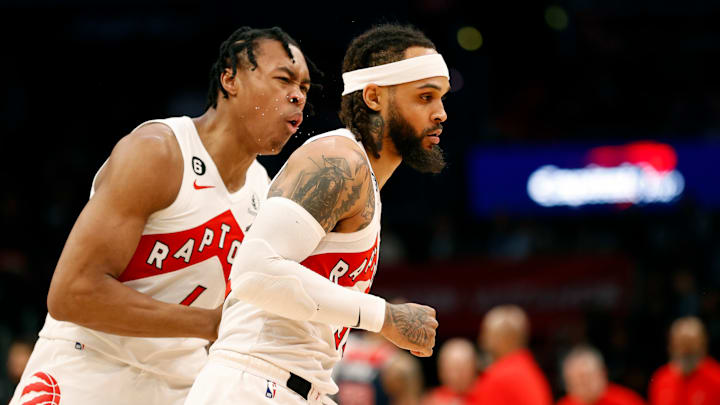It is very possible that the best value signing of the entire NBA offseason turns out to be Gary Trent Jr.
The former Toronto Raptors shooting guard signed with the Milwaukee Bucks on a minimum salary for one year. In doing so, a two-way wing expected to command north of eight figures joins a team that couldn't offer anything more than the minimum, representing a substantial value for the 2021 NBA champions.
Whenever a player signs at a steep discount, it begs the question of what other team should have offered more. Naji Marshall signed for just $9 million, while D'Anthony Melton signed for only $12.9. Shouldn't the Raptors have offered more? That's the question every team asks whenever there is perceived value around the league. In the case of Gary Trent Jr., most of the league wishes they could have added a player of his caliber at such a cheap cost.
That brings up the question of whether the Raptors were the team that most dropped the ball when it came to Trent's bargain contract.
Did the Raptors drop the ball?
Bleacher Report recently went around the entire league and identified their biggest win and biggest loss of the offseason. For the Raptors their biggest win was that Scottie Barnes is signed for five full years with no player option; their biggest loss was Gary Trent Jr.
From a pure talent perspective, that's absolutely true. Jalen McDaniels, Jordan Nwora, Malik Williams and Javon Freeman-Liberty were not needle-movers. Trent was a valuable piece of their rotation and often a starter, and he left in free agency.
What Bleacher Report draws out is that it's not just the "loss" of the player, but that the Raptors should feel like they lost for not being able to bring Trent back at a discount. They write that "at the very least, it feels like the front office should have gotten a better read on Trent's future."
That's probably fair, and perhaps a middle ground could have been found between the two sides before contract negotiations chilled, but Trent came to the Raptors expecting $20 million per season on a new deal. The Raptors did offer him a sizable deal, reportedly in the range of the Mid-Level Exception, and they were turned down.
Toronto then pivoted, drafting another player at the same position as Trent in Baylor wing Ja'Kobe Walter, then drafting Jamal Shead in the second round and trading for Davion Mitchell to further build out the backcourt. It's nice to say the Raptors should have brought Trent back at a bargain number, but there wasn't room for him on the roster anymore. Toronto has seven shooting guards as it is.
B/R also chastises the Raptors for not having enough shooting and points to that as a reason to keep Trent around. The problem is that the Raptors' roster imbalance means they can't simpyl stack good shooters on top of one another at the same position; bringing back Trent would have meant a reduced role for Gradey Dick, one of their only high-end shooters. Trent can't simply grow four inches and become a forward.
The Raptors may have been able to thread the needle and bring back Trent on a fair deal to trade him later, but they tried that a year ago and nothing materialized. Trent was never going to get the playing time in Toronto he will see starting for a contender in Milwaukee, and while he will make a little less money this year, he hopes to parlay that into a payday next summer.
Was Gary Trent Jr. the Raptors' greatest loss this summer? Technically it's true, but functionally he was never going to come back on anything short of an overpay, and the Raptors were right to let him walk.
